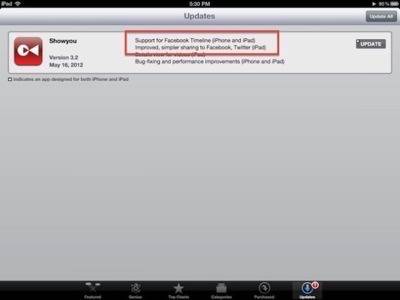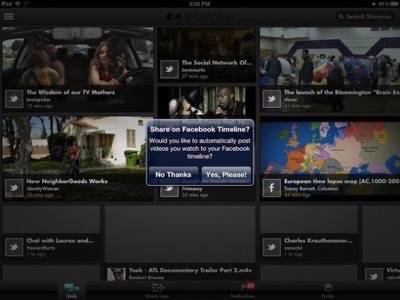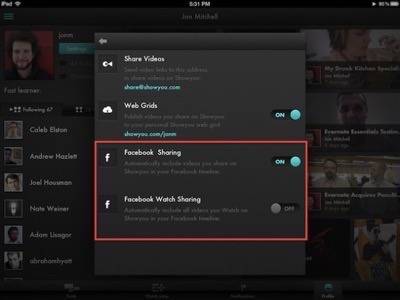
Facebook’s Open Graph is too tempting for app developers. All they need is the slightest bit of permission from the user, and then they can go nuts posting all kinds of app activity for all that person’s friends to see. Some apps can’t resist the chance to promote themselves, and they run the risk of disrespecting their users. Here’s a case study.
Facebook’s Open Graph allows for so-called “frictionless sharing.” In practical terms, that means sharing activities in an app without requiring an intentional click of a share or like button. And for certain kinds of applications, it’s a great idea. Some people like to share their music listening habits, for example, and apps like Spotify and Rdio make it easy.
But the benefit to the user is often less obvious. If the user is reading smutty tabloid articles or politically sensitive Storify posts, he or she might not want to broadcast that to every Facebook friend. Apps that use frictionless sharing require people to be constantly vigilant, and that’s an unrealistic expectation.
Frictionless sharing certainly helps app publishers promote themselves, but they can easily take advantage of users to do so.
The most rampant abuse of user trust occurs in the process of getting permission to turn on frictionless sharing in the first place. Many apps flip the necessary switches without asking, forcing users to opt out – if they can figure out how.
A Case Study
Yesterday, Showyou released an update that enables Facebook Open Graph sharing for its video-loving users. The workflow that enables sharing illustrates the line between respecting and disrespecting users.
The first step is to have good release notes for the update. Showyou puts Facebook Timeline right at the top. That’s a good start.

When you launch the new version, the first thing you see is a dialogue about Facebook Timeline. Showyou did a great job wording this. It’s perfectly clear what the app is asking, and the choices are “No Thanks” and “Yes, Please!” Do you want to automatically share the videos you watch on Showyou with your Facebook friends? That should be an easy question to answer.

I tapped “No.” Check out the user settings after this dialog.

The first Facebook-related thing I see is “Facebook Sharing,” and that’s on! That’s not what I wanted. But then, below that, I see that “Facebook Watch Sharing” is off. Ah! Having read carefully, I see what happened. Showyou asked if I wanted to share the videos I watch to Facebook, and it respected my wishes. But it went ahead and assumed that videos I share on Showyou should go to Facebook, too.
The app almost got it right. It respected my choice about sharing the passive act of watching, but it took the liberty of assuming I would want to share the same videos with all my Facebook friends that I share with my Showyou friends.
Don’t Make Assumptions
Mark Hall, CEO of Remixation (maker of Showyou) explains that “videos you share on Showyou are already getting added to your public grid,” referring to the Showyou Web view, which is visible to the public. “We thought most people would want to have [Facebook sharing] on, so friends would see that new videos have been added to your grid.”
Hall’s assumption goes too far. Just because I shared a video in a way that is publicly visible does not mean I want to push that action into my friends’ Facebook news feeds. I might want to, but not without being asked first. In a user’s mind, sharing on Showyou is not connected with sharing on Facebook, because Showyou never told the user it was turning on such sharing.
Showyou’s next version will do the right thing, though. “In our next update,” he says, “we’re going to move these permissions into a second step on install (for new users).” That’s all it needs to do. Many people will likely want to use these features, but the app shouldn’t turn on any of them without asking.
Developers, don’t be afraid of users’ preferences. Open Graph actions surely seem like a tempting way to get the word out about your app, but it’s not worth leaving your customers feeling burned. More importantly, it’s not worth irritating their friends with constant “frictionless” updates. Those are the people you want to convert, right? People happily share from apps they think are great. They do it on purpose. Help them stay in control of what they share, and they’ll respect you back.
Image courtesy of Shutterstock

















